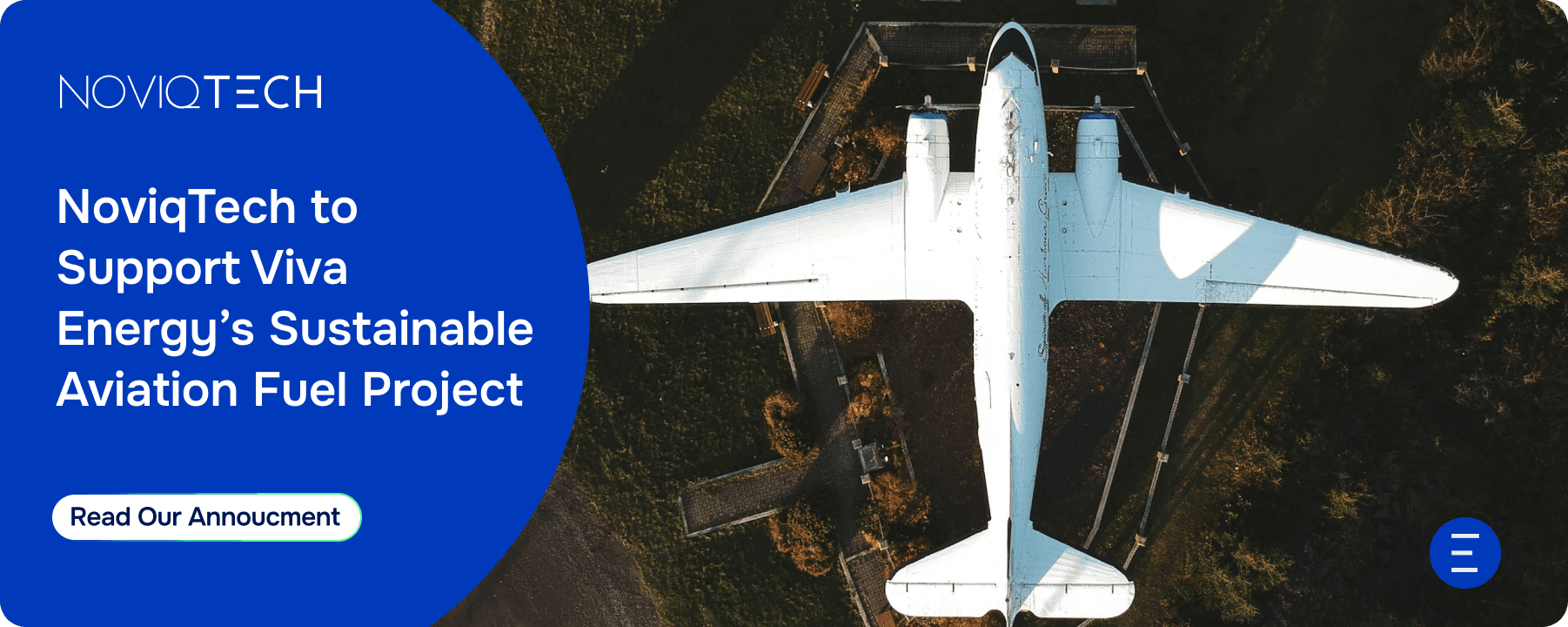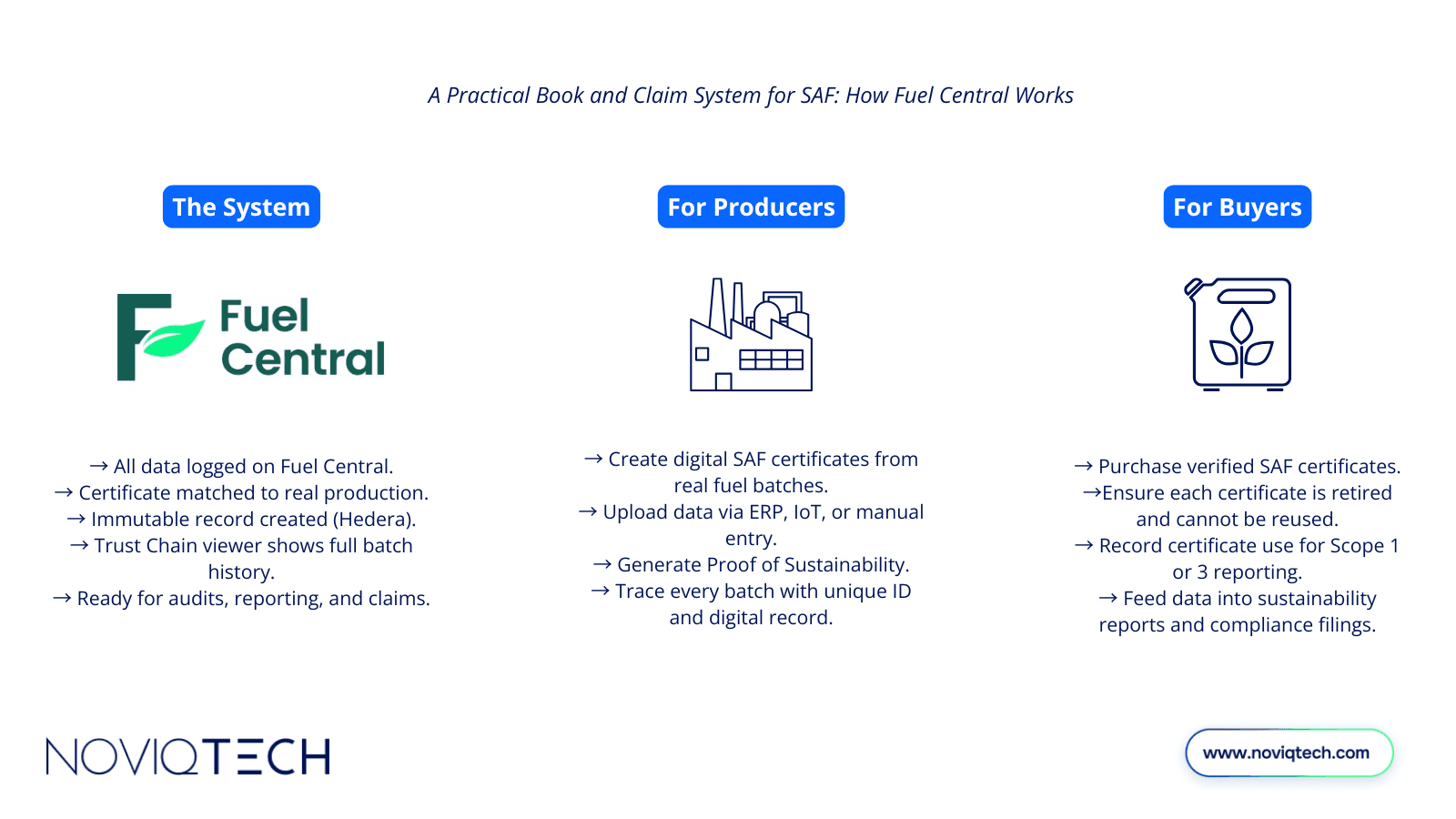7 mins read
Published Sep 1, 2025
What is the Book and Claim Model and How Does it Work in the Context of SAF
Australia is geographically vast with widely dispersed air travel routes, a setup that favours a Book and Claim system for SAF.
Although Australia does not currently have mandated SAF blending targets, Qantas, part of the Federal Government’s Jet Zero Council, has a target is for 10% of their fuel use to come from SAF by 2030 (around 600ML of unblended SAF a year) and approximately 60% by 2050. Hitting these targets is challenging when local SAF production is still nascent.
Qantas, Jetstar and Virgin Australia have also introduced voluntary carbon offset schemes which allow passengers to purchase offsets for their flights.
As of mid-decade, Australia produces little to no SAF domestically, although it has ample feedstocks, the refining capacity and supply chain are still being developed. This creates a gap between the desire to use SAF and the ability to physically get it everywhere.
Book and Claim offers a practical solution now. Instead of hauling bio jet fuel across the continent, SAF can be blended where it’s most efficient, while airlines operating anywhere in the world receive certificates tied to that batch.
This model reduces transport-related emissions, simplifies logistics, and expands access to high-integrity SAF across regions. Whether the fuel is made in Brisbane or overseas, airlines can engage in credible decarbonisation supported by auditable data.

Book and Claim: A Chain-of-Custody Model to Advance the Uptake of Sustainable Aviation Fuel
Book and Claim is a chain-of-custody system that lets sustainable aviation fuel (SAF) producers and users trade the environmental benefit of SAF separately from the physical fuel, without having to ship the physical fuel to the recipient of the environmental benefits.
To understand this better, let’s compare it to the traditional mass balance model of fuel handling:
Mass Balance: SAF is physically blended with fossil jet fuel at certified locations and tracked through the supply chain. With every tonne of SAF is mixed in, records ensure that no more “SAF” is claimed than was put in through accurate bookkeeping. The fuel a particular aircraft gets may be mostly conventional fuel, but via bookkeeping we know a certain percentage was SAF overall. This requires actual physical uptake of the fuel, irrespective of whether the fuel is sold as SAF or conventional jet fuel.
Book & Claim: No physical delivery to the end user of the credits is needed. A producer adds SAF into the fuel system (for example, a jet refuelling system for planes at an airport near the SAF facility) and generates credits for the sustainable fuel produced. An airline or company elsewhere can purchase those credits and claim the associated emissions reductions, even though their specific jet burned regular fuel. It differs from mass balance in that the sustainability claims are traded independently of physical fuel delivery.
Using a Book and Claim approach means you don’t have to be physically connected to the SAF supply chain to support the SAF market. The environmental benefit – lower lifecycle emissions, use of sustainable feedstocks, etc. – is what’s being transferred. This model is recognised by global frameworks (for example, CORSIA, the UN’s aviation carbon program, allows book-and-claim transactions) and sustainability standards (ISCC, RSB, SAFc), even though some regulatory mandates still prefer mass balance for now.
A handy analogy is to think of how banks work: you can deposit money in one branch and withdraw in another. Similarly, a company can “deposit” SAF into the aviation fuel pool in one place and “withdraw” the environmental benefit elsewhere, if the accounting is solid.
How Book and Claim Expands SAF Market Access for Producers and Buyers
From the perspective of SAF producers, Book & Claim is a powerful tool to expand their market and de-risk investment in new capacity. For buyers, it creates a credible, immediate path to participate in aviation decarbonisation, while supporting global increase in the uptake of sustainable fuels and contribute towards developing local supply chains for such fuels.

Figure 1: Opportunities of the Book and Claim Model for SAF in Australia.
In a traditional setup, fuel must be shipped to its point of use. If you’re producing SAF in the U.S. or Asia and want to serve buyers in Australia, that often means high costs and limited options.
Book & Claim changes the equation. Producers can sell SAF certificates to any buyer, anywhere, without moving the fuel itself. That means they can start supplying the Australian market virtually, and immediately, capturing the environmental value of their product while infrastructure catches up.
For producers planning new facilities, this model also acts like a pre-order system. Buyers can signal demand in advance, offering the commercial confidence (and in many cases, financial leverage) needed to secure investment. Early certificate purchases become powerful market signals.
In fact, industry experts emphasise that corporate demand via mechanisms like Book & Claim is crucial to scaling up production. “Book & Claim is the single most important method to scale biofuel solutions for aviation,” notes Adam Klauber, a sustainability executive at World Energy, “It allows customers to confidently purchase SAF certificates and, in turn, their demand unlocks new loans and investments to build SAF plants.”
In other words, when producers see buyers putting money on the table (even for certificates), it de-risks the business case for building more SAF capacity. Banks and investors also see that tangible demand and are more likely to finance new projects.
Importantly, this model opens access for producers of all sizes. Even smaller or early-stage SAF makers can issue certificates, generate revenue, and reach global buyers, creating visibility and growth that might not be possible through local channels alone.
It also allows buyers to scale participation. A corporate client or airline can buy more certificates than a local airport could physically supply today, sending a clear demand signal and encouraging further production. With each verified batch matched to a buyer, the risk of unsold inventory drops.
Crucially, Book & Claim helps get things moving now. While Australia’s first large-scale SAF plants are still years away (like the one proposed in Queensland by Jet Zero Australia), producers overseas are already operating. Through Book & Claim, Australian airlines can begin supporting SAF now, building experience with sustainability accounting while funnelling real investment to producers. This early participation lays the groundwork for a smoother market transition once domestic SAF becomes available.
In short, Book & Claim makes SAF tradeable, even before supply chains mature. It accelerates scale, reduces risk, and connects demand with production at a global level.
This buys time for infrastructure, it buys volume for producers, and it helps make aviation decarbonisation a reality, starting today.
A Practical Book and Claim System for SAF: How Carbon Central Works
Developed as a fork of our consolidated Carbon Central platform, Fuel Central provides the data transparency and bookkeeping tools for the SAF supply chain. In essence, it acts as a data catch-net, recording SAF transactions across sites and regions, and acts as a tracking system for sustainable fuel credits, offering a one-stop solution for producers and buyers to transact with confidence.
Fuel Central can support data compliance and/or bookkeeping requirements for Book and Claim across leading standards, such as RSB, ISCC, SABA SAFc, etc.

Figure 2: A Practical Book and Claim System for SAF: How Fuel Central Works.
For SAF Producers
Fuel Central enables producers to:
Issue digital SAF certificates linked to real on-site production data, or upstream feedstock sustainability information from Proof of Sustainability or similar documents.
Integrates with IoT sensors, ERP systems, and manual uploads to create a digital twin (a virtual model) of SAF operations and capture:
Feedstock properties
Trace fuel production
Total emissions.
Automatically generate Proof of Sustainability certificates for downstream partners and customers.
Log each certificate on a tamper-proof blockchain ledger (Hedera), with:
Unique IDs.
Timestamped batch details.
Full traceability through our Trust Chain viewer.
This provides producers with:
A transparent audit trail.
Verifiable claims for buyers and regulators.
Compliance for ongoing sustainability certifications
Digital-ready transactions that don’t require any new infrastructure.
For SAF Buyers
Fuel Central makes it easy for airlines and corporates to:
Purchase SAF with confidence in emissions and chain-of-custody data.
Prevent the risk of greenwashing and double accounting.
Claim GHG emissions benefits for Scope 1 and Scope 3 emissions reporting.
Feed data into sustainability reports and compliance filings.
Ultimately, Fuel Central acts as both a bridge and an accelerator. It connects SAF producers, distributors and buyers across distances as a trusted, neutral platform for exchanging environmental attributes and it speeds up adoption of SAF by making Book and Claim accessible and verifiable.
Get in touch to see how Fuel Central can support your SAF strategy.
Whether you’re a producer, buyer, or policymaker, we’ll help you set up a Book and Claim system that works in practice, backed by real data, traceable claims, and global standards.






